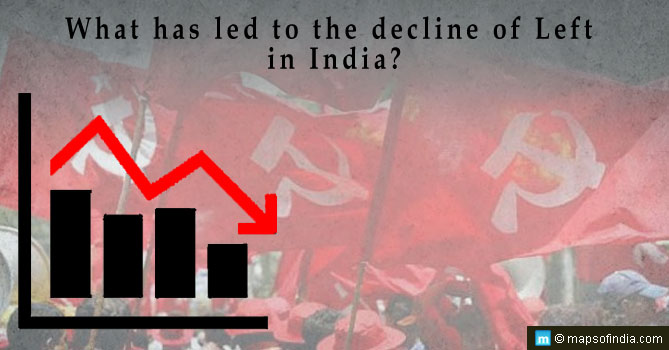
As far as communism is concerned, outside the four existing socialist countries China, Vietnam, Cuba and North Korea, India holds a prominent position. Due to the disintegration of the Soviet Regime and the downfall of Marxism in some of the existing socialist regimes in Eastern Europe, communism, in general, suffered a crushing blow. However, communism had strong roots in Kerala and West Bengal, the two of India’s most literate states.
Why?
Probably, the pursuits of the people of these states matched the Leftist ideologies. Communist governments have made its mark in West Bengal where the Leftist government has ruled for more than three decades and also in Kerala, and even in Tripura. However, despite the presence of communist ideologies across these states, the communist entities are still a parliament minority. Does this mean that communist ideologies are failing in India? Why was communism unable to echo from other Indian states?
Is Communism Relevant to India?
According to Prakash Karat, General Secretary of the Communist Party of India-Marxist (CPI-M), the leading communist faction, “This necessitates action and rethinking”. However, in the present perspective, this also raises a question, “Whether communism is at all relevant in the current Indian political scenario”.
If we analyse the methods of the ruling of some of the Communist regimes in India, we may cautiously surmise that India’s romance with communism might have reached an end.
This is evident from the fact that during the thirty-plus years of the regime of the Leftist government in West Bengal, there was not a single attempt of large-scale industrialisation especially when the “poster boy” of the Left, Jyoti Basu, was the esteemed Chief Minister. When Buddhadeb Bhattacharya came to power, his drastic attempts of taking lands from the peasants for industrialisation created a lot of outrage among the elite and the literate classes of West Bengal along with the poor peasants who were being directly affected. This, coupled with the inefficient governance, created a significant setback in gaining the support of the masses.
India is the land of Ramkrishna Paramahansa, Swami Vivekananda and Aurobindo Ghosh and undoubtedly one of the largest spiritually oriented nations. The Leftist government’s principle of atheism only further alienated the common masses.
In a nutshell, the Leftist government so far has been a total failure to synchronise with the socio-economic trend of the majority. From a bigger perspective, the Leftist government always opposed privatisation and land reforms were on the top of their priority list.
India has been making significant economic growth, and over the years, it has been able to secure a key position on the global stage which would otherwise have been doubtful under the rule of a Leftist government with their anachronistic ideologies.
Liberalisation, privatisation and reforms in the public sector are the ideas of the day. Victor Hugo once said that no force could stop an idea whose time has come. Gone are the times of the antique Leftist ideas, the days of still looking at the world through a Cold War lens. Karl Marx, Joseph Stalin and Vladimir Lenin are but pale shadows now. An advocator of Hindu fundamentalism, even the BJP is gearing up to emerge as a more moderate political party.
However, this is a question that plagues not only India but the rest of the world as well.





